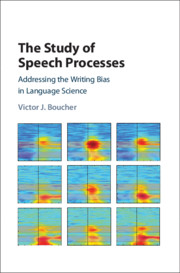Book contents
- The Study of Speech Processes
- The Study of Speech Processes
- Copyright page
- Contents
- Figures
- Tables
- Abbreviations
- Preface
- Introducing a Fundamental Problem of Language Science
- Part I Questions of Ontology: Writing and the Speech–Language Divide
- Part II Questions of Epistemology: The Role of Instrumental Observations
- Part III The Structure of Speech Acts
- Part IV The Processing of Speech Meaning
- 10 The Neural Coding of Semantics
- 11 Processes of Utterance Interpretation: For a Neuropragmatics
- Epilogue
- References
- Index
11 - Processes of Utterance Interpretation: For a Neuropragmatics
from Part IV - The Processing of Speech Meaning
Published online by Cambridge University Press: 14 January 2021
- The Study of Speech Processes
- The Study of Speech Processes
- Copyright page
- Contents
- Figures
- Tables
- Abbreviations
- Preface
- Introducing a Fundamental Problem of Language Science
- Part I Questions of Ontology: Writing and the Speech–Language Divide
- Part II Questions of Epistemology: The Role of Instrumental Observations
- Part III The Structure of Speech Acts
- Part IV The Processing of Speech Meaning
- 10 The Neural Coding of Semantics
- 11 Processes of Utterance Interpretation: For a Neuropragmatics
- Epilogue
- References
- Index
Summary
The context-based selection of semantic representations is presented as an essential issue in understanding the interpretation of speech meaning. Clinical findings serve to illustrate the role of the thalamus, the basal ganglia, and the cerebellum in processing subtle context-related differences in meaning. The paucity of findings relating to spoken language is emphasized along with the need to specify neuropragmatic principles of context-based activations of semantic and episodic representations.With a view on developing such principles, several relevant findings are reviewed relating to cortico-thalamic interactions and the pivotal role of the motor thalamus in integrating multisensory information from basal-ganglia circuits and the cerebellum. The on-line selection of semantic and episodic representations is also discussed in terms of experiments on the role of the hippocampus and frontal circuits suggesting some parallels with navigation, but the on-line processing of speech requires a chunking of action-related sequences which appears to involve the basal ganglia and critical cortico-thalamic loops.
Keywords
- Type
- Chapter
- Information
- The Study of Speech ProcessesAddressing the Writing Bias in Language Science, pp. 220 - 238Publisher: Cambridge University PressPrint publication year: 2021

